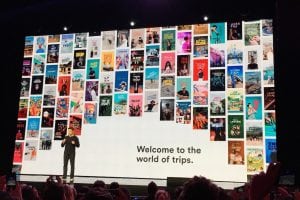United's New Basic Economy Fares Are More Restrictive Than the Competition — Skift Business Traveler
Skift Take
What to Know Now
More details on United's upcoming basic economy fares came out last week and the perks are leaner than many expected. More prominent among the planned upcoming fees: Starting next year, passengers booked in basic economy will have to pay extra to bring an overhead bag on the aircraft. Additionally, passengers won't be able to accrue elite qualifying miles on the fares.
These two changes are a direct departure from the basic economy fares that Delta is currently offering and to many, are pretty big drawbacks to the product. But under the new United run by Oscar Munoz, revenue is king — and if it makes money, it's worth pursuing.
It's still not clear which routes will operate with the new pricing or when the product will roll out, but one thing is certain: Passengers booking United's basic economy fares are about to get a lot less than on other competing products.
Your move American.
Social Quote of the Day
@RenesPoints it's market segmentation. The fare targets the infrequent, brand-neutral/agnostic pax. Pax have more choice & control. @united
- @hharteveldt | Henry Harteveldt, Airline, hotel and travel industry analyst
Airlines
Alaska Air Nearing Deal With Regulators to Seal Virgin America Buy: Alaska Air Group Inc. is close to reaching a settlement with U.S. antitrust officials that will allow it to complete its proposed acquisition of Virgin America Inc., according to people familiar with the matter. Read more at Skift
Even Emirates Is Facing Up to the Threat Posed by Low-Cost Carriers: Emirates, known for luxurious planes with showers and bars, is considering adding cheaper long-distance flights in order to better fend off aggressive competition from low-cost carriers. Read more at Skift
Here’s How United CEO Oscar Munoz is Beginning to Remake the Airline: Roughly 14 months after CEO Jeff Smisek resigned from United Airlines amid allegations he may have tried to bribe a New Jersey government official, his successor, Oscar Munoz, is finally leaving his imprint on the carrier. Read more at Skift
Airlines Are Improving In-Flight Meals to Appeal to Big Spenders: Despite being the butt of jokes since the early 1960s, the in-flight meal is serious business for U.S. airlines and an increasingly major front in the battle for the high-spending customers who sit in first and business class. Read more at Skift
Airports
Airport Security Lanes Get Automated Bins in Time for Thanksgiving Crush: U.S. airlines grapple with a lopsided reality: While a huge amount of revenue flows from a small pool of sky warriors, the vast majority of customers pony up for a ticket just once a year. This time of year. Read more at Skift
Why LaGuardia Airport Never Seems to Get Better: By now, it’s no secret that LaGuardia Airport is among the least-liked (and least efficient) airports in the United States. Read more at Conde Nast Traveler
U.S. Travel and Members of Congress Have a Plan to Modernize the TSA: As travel industry stakeholders gear up for the Trump administration, U.S. Travel has released a plan to help bring the Transportation Security Administration (TSA) into the future with a combination of common sense reforms and cutting-edge technology. Read more at Skift
Tech
Exclusive: Room 77 Investors Lost Half of Their Investment, Employees Got Nothing: As the original Room 77 liquidates the company, founder Brad Gerstner of Altimeter Capital and CEO Drew Patterson informed preferred shareholders that they would receive just 53 cents for every dollar invested, Skift has learned. Read more at Skift
Is Los Angeles ready to rethink the car? When people say Americans won’t give up their cars, Los Angeles is a case study on automotive saturation. Car fever took off during the post-World War II economic boom, and the sprawling city’s far reaching tentacles of freeways make the automobile essential. Culver City speed shops and custom car culture elevated LA’s romance with the automobile to another level. But a new reality has set in, and so far, no one is exactly sure how to stop it. Read more at The Verge
Lyft Is Ditching the Pink Moustache for Light-up Beacons: Ride-hailing service Lyft, the underdog rival to Uber, is getting rid of its iconic pink moustache logo and replacing it with something more useful — beacons. Read more at Skift
Hotels
Interview: Four Seasons CEO on the U.S. Election, Loyalty, and Scale: The day before another hotelier was elected to the highest office in the U.S., Skift traveled north to Toronto to meet with Four Seasons Hotels and Resorts president and CEO J. Allen Smith to talk about the challenges facing the luxury hotel market, and what lies ahead for the future of hospitality. Read more at Skift
Airbnb Launches Trips, Its Big Tours and Activities Gamble: Airbnb is making good on its global campaign promise to help guests “live there” with its newest product launch. Read more at Skift
An Inside Look at Four Seasons’ Working Hotel Laboratory: It’s here, in Four Seasons’ new Research and Discovery Studio, also called the R&D Studio, where the company has built itself a working laboratory for testing out and dreaming up every little detail imaginable when it comes to operating its more than 100 hotels worldwide. Read more at Skift
Your Turn
David Farley's latest piece on doner kebabs in Berlin is a great distraction from this calamitous election season. Read it here.
Tips and Comments
Can be sent to gm[at]skift[dot]com or to @grantkmartin








